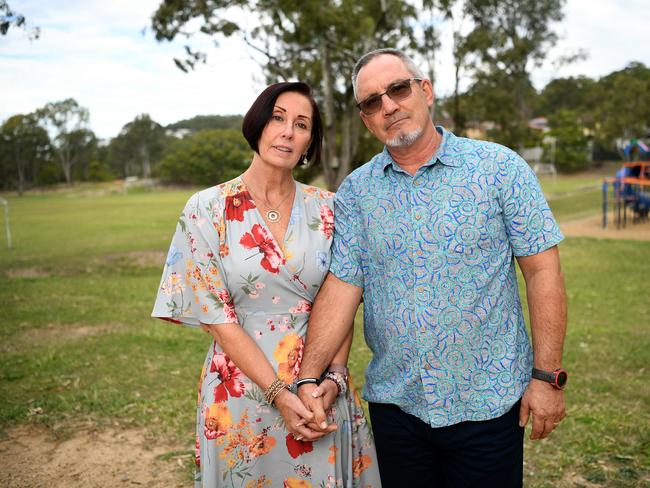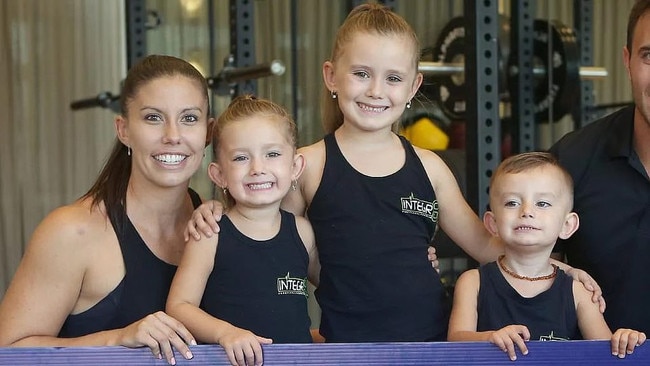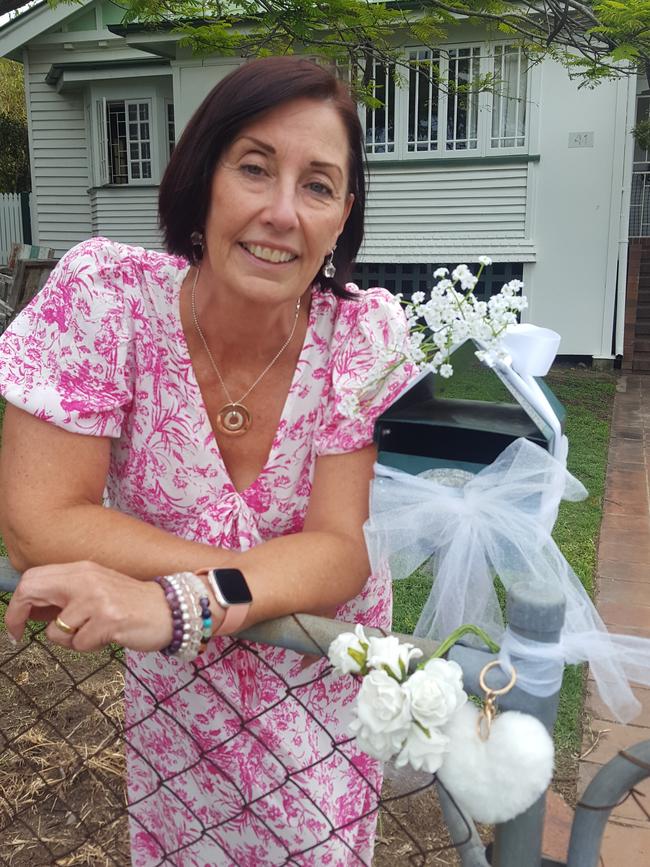‘When he kills me’: Clarkes’ fight to save other families
THE MURDER of Hannah Clarke and her children left a nation in mourning and launched a conversation about domestic violence, but in order to save lives, Sue and Lloyd Clarke said there’s a long road ahead.

Central & North Burnett
Don't miss out on the headlines from Central & North Burnett. Followed categories will be added to My News.
"MUM, what happens to the kids when he kills me?"
This was the tragic question Hannah Clarke asked her mother, Sue Clarke, one week before she, along with her three young children, were burnt to death by her estranged husband Rowan Baxter inside a car along a quiet Brisbane suburb street on the morning of February 19 in a case of domestic violence which shocked Australia to its core.
The horrific killings of Hannah and her children Aaliyah, 6, Laianah, 4, and Trey, 3, forced the Australian public to confront the scourge of domestic violence but the issue soon faded into the background when the COVID-19 pandemic first hit.
But Sue and her husband Lloyd Clarke, a Kingaroy local, are determined to keep the conversation going and educate other families about domestic violence and coercive control.
"We started up our own foundation, Small Steps for Hannah, because we want to get the conversation started about White Ribbon and about domestic violence, in particular coercive control," Mrs Clarke said.
"More and more people are having the conversation. The message is getting out there, but not enough."
Lloyd said he and Sue were "thrust into the national spotlight", and while this is the last place they wanted to be, they've taken the opportunity to help others walking a similarly dangerous path.
Domestic violence can carry on for years in the form of psychological and financial abuse, and to an untrained eye, can go largely unnoticed. It is not until you look back that the fog clears and the warning signs are visible.
By this point, it's often too late.
"When I look back, I can see small subtle signs right from the beginning. But because it's so small, and starts off so subtly, you don't notice or make excuses. Little things like, she wasn't allowed to walk up the beach in a bikini. I just thought he was prude," Mrs Clarke said.
"And then he got her to shut down her Facebook page and have a joint page. He convinced us it was because they had the same friends and they'd be doing the same posts."
"And you know, at the time it made sense, but looking back, it was all a very subtle start to the coercive control, which had been happening almost right from the beginning of the relationship."
Coercive Control Warning Signs
- Isolating you from your support system
- Monitoring your activity throughout the day
- Denying you freedom and autonomy
- Gaslighting
- Name-calling and putting you down
- Limiting your access to money
- Reinforcing traditional gender roles
- Turning your kids against you
- Controlling aspects of your health and body
- Regulating your sexual relationship
- Threatening your children or pets
Mrs Clarke said as the victim gets stronger, the coercive control escalates. By the time Hannah was ready to leave, Baxter was going through her handbag, going through her phone, and was even tracking her location.
"The week before he killed her, she came to me and asked if she should write a will. She said to me, 'Mum, what happens to the kids when he kills me?' Because, she said to me, I want you to have them," she said.
"In her mind, she knew he would kill her."

Despite breaching several domestic violence orders, and even kidnapping Hannah's daughter Laianah and taking her to northern New South Wales for a number of days, Mrs Clarke said the law offered little help in these types of cases.
"There's nothing the police could do. She had no proof. This was just a gut feeling she had," she said.
"We have talked to the police and they said once in a blue moon, people like this are born and there's just nothing you can do. He would have killed her no matter what we did."
On the night before Hannah's death, Mr Clarke said Baxter rang the house and insisted on speaking to the kids.
"It was all premeditated. The whole time, he was just a blubbering mess," Mr Clarke said.
"Hannah thought he would kill himself and she felt terrible."
On February 19, 2020, Mrs Clarke was at work when she discovered the harrowing news. After hearing reports of three children being burnt to death on Raven Street at Camp Hill, Sue's heart dropped.
After suffering burns to 93 per cent of her body, the family said their final goodbyes to Hannah before her life support was switched off at 5.30PM.
In the months following, the family were showered with support by friends and strangers alike, with Brisbane City councillor Fiona Cunningham even setting up a memorial at Camp Hill called 'Hannah's Place'.
"We go there and reflect, and we put more trees in so they will flower and attract butterflies," said Mr Clarke, adding that butterflies, as well as two footprints, are the symbol for Small Steps for Hannah.
"We've got two feet - what they did at the ICU, they normally get a handprint, but her hands were so badly burnt they couldn't even get a print, so they took her foot. And that became the symbol for Small Steps," he said.
"And then the three butterflies are our grandchildren, because they're beautiful little things, butterflies, and they're not on this earth for too long."
This year, Mrs Clarke will be joining White Ribbon Queensland in their letterbox campaign, to "get the message out there" and prevent what happened to her daughter and grandchildren from happening to others.
"I will not be able to hug them again, but we together, can make a change and break the cycle of domestic and family violence."

The campaign, which enables Australians to get behind the White Ribbon cause in a COVID safe manner, is the brainchild of Lisa Miller - who herself is a survivor of domestic violence.
One year and one day prior to Hannah's tragic death, Ms Miller was strangled by her husband of 15 years at his place of work in Brisbane.
"I'd given up my career in Sydney and relocated my family. His business had been liquidated, but he proceeded to take money out of the bank account, when I couldn't pay wages," she said.
"I said 'what are you doing?' He shut the door and proceeded to strangle me."
After nearly falling unconscious, Ms Miller was only able to escape his grasp by biting his wrist.
"I took myself to the local police station and from there I was taken by the ambulance to hospital. All reports say there was a swollen red neck"
"But he then went to the police and said 'I'm crazy, I self-harm, I threw myself against the wall, and I lunged at him and bit the inside of his left wrist'."
Similar to Hannah's early experience, Ms Miller said she was not aware of the warning signs until after the relationship had turned violent and she'd had time to reflect. It was at this point Ms Miller realised she'd been "gaslighted".
After sowing seeds of doubt in her mind about her own worth and capabilities for years, Ms Miller said her ex-husband had her convinced she was stupid, useless, an inept parent, and even that she couldn't drive a car.
"If you get told something enough times, you actually tend to believe it," she said.
Ms Miller said many survivors of domestic violence, including herself, are ashamed of their situation and can have a hard time admitting to themselves and others what has happened.
"It took me a long time to talk about it. Admitting it out loud, that it happened, was shameful," she said.
"I felt like I let this happen. Because I put myself and my kids in that position and I didn't see the signs."
"I was trusting and supportive of my ex-husband, right up until the day that he was strangling me and had me in a headlock."
With 1 in 3 Australian women at risk of being a victim of domestic violence in their lifetime, everyone is encouraged to decorate their letterboxes with white ribbons to promote respectful relationships and create a community free of violence and abuse in Queensland and nationwide.
For 24-hour domestic violence support call the national hotline 1800 RESPECT on 1800 737 732 or MensLine on 1800 600 636.
If you are in immediate danger call triple-0.



